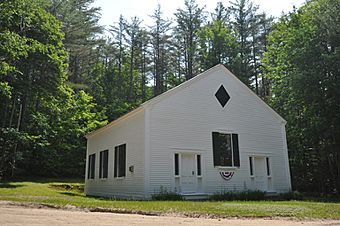White Meetinghouse facts for kids
Quick facts for kids |
|
|
White Meetinghouse
|
|
 |
|
| Location | Towle Hill Rd., Eaton, New Hampshire |
|---|---|
| Area | 0.4 acres (0.16 ha) |
| Built | 1844 |
| Architect | Allard, Stephen |
| Architectural style | Greek Revival |
| NRHP reference No. | 80000274 |
| Added to NRHP | May 15, 1980 |
The White Meetinghouse is a special old building in Eaton, New Hampshire. It's also called the First Freewill Baptist Society Meetinghouse. This historic meeting house is on Towle Hill Road. It was built way back in 1844.
The building is a great example of a Greek Revival style meeting house. It has not changed much since it was built. The White Meetinghouse was added to the National Register of Historic Places in 1980. Today, a local group takes care of the building. They use it for community events and sometimes for church services.
Contents
Exploring the White Meetinghouse
The White Meetinghouse is in a quiet, rural area of Eaton. You can find it at the corner of Towle Corner Road and Burnham Road. It is a single-story building made of wood. The roof has a triangular shape, called a gable roof. The outside walls are covered with clapboards.
Inside the Meetinghouse
The front of the building looks simple. It has two doors. Each door has narrow windows on the sides. These doors lead into small entry rooms. From these rooms, you can enter the main meeting area.
The main room has long wooden benches called slip pews. These pews face the front of the building. At the back, there are two rows of raised pews. These were for the choir. All the pews are original to the building. They even have numbers on them. These numbers show who helped pay for the building's construction.
The meetinghouse has never had electricity. It is heated by a wood stove. A long pipe from the stove goes up to the chimney.
History of the Building
The meetinghouse was built in 1844. It was made for a group called the Free Will Baptists. Stephen Allard, a local builder, constructed it. He built many other buildings in the area that are still standing today.
The church group grew the most around the time of the American Civil War. After the war, fewer people attended. The congregation eventually stopped meeting in the 1930s.
More to See



